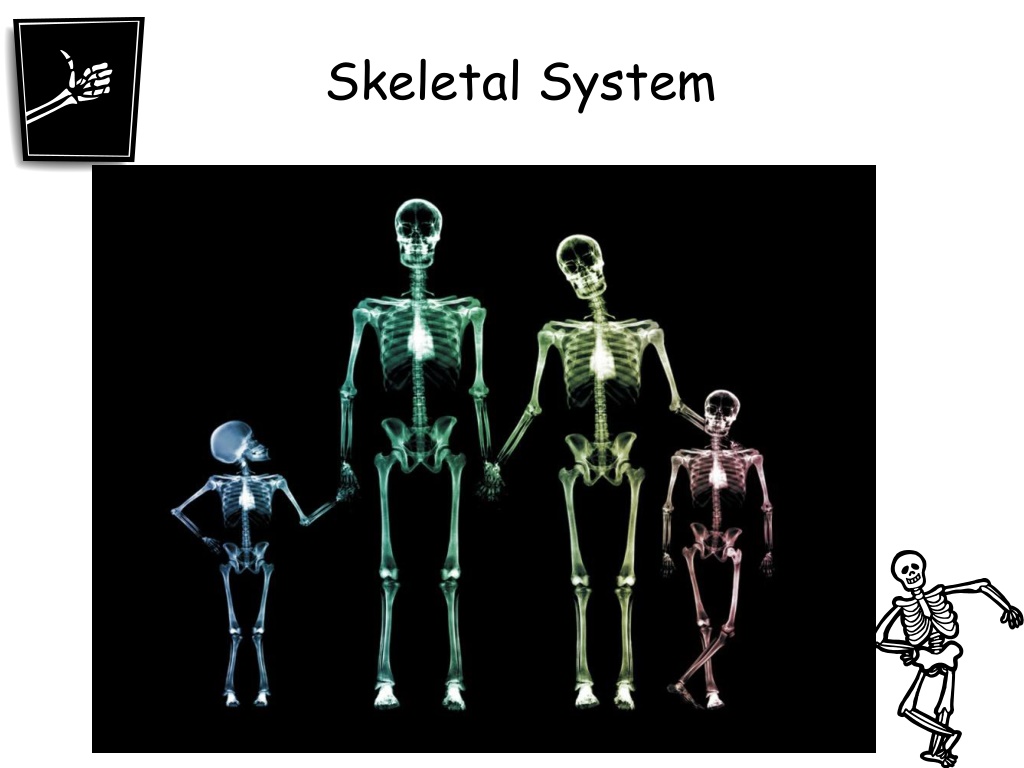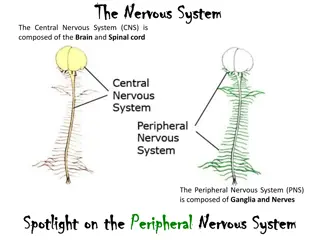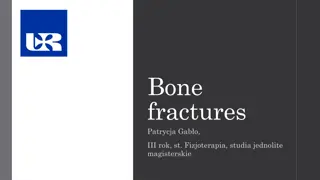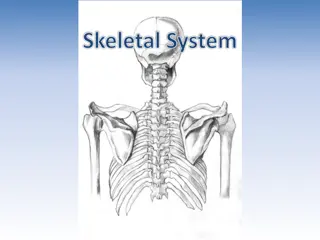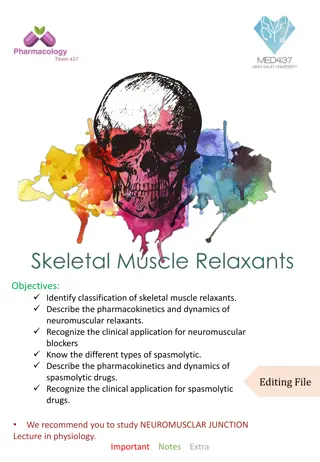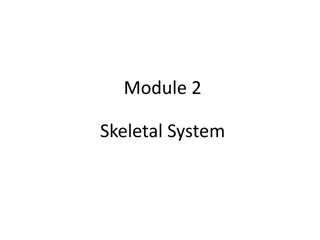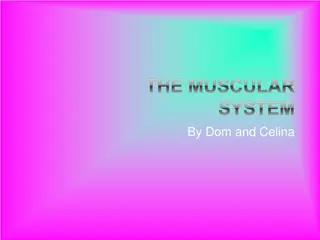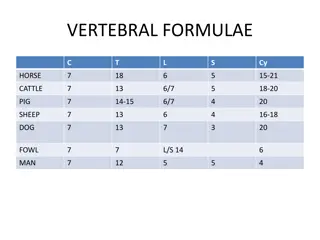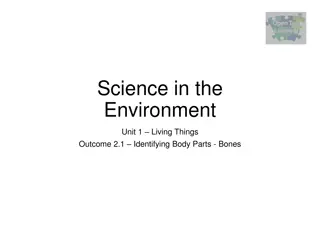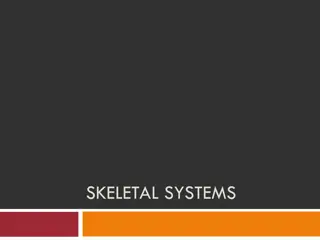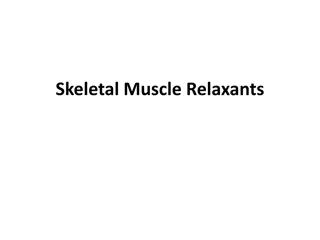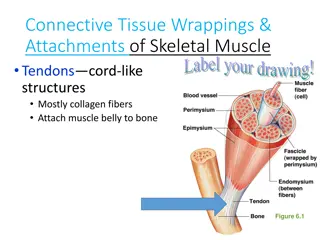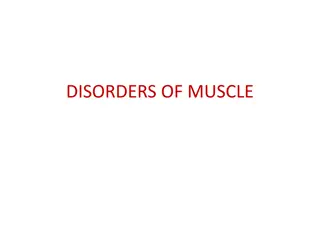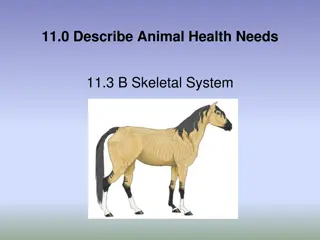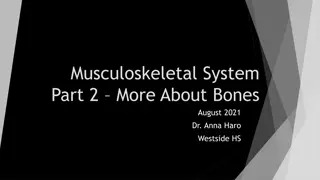Exploring the Human Skeletal System
The skeletal system plays crucial roles in supporting the body, protecting internal organs, facilitating movement with muscles, and producing blood cells. It consists of various bone structures like periosteum, compact bone, spongy bone, and bone marrow. The cranium houses important bones such as the parietal bone, frontal bone, temporal bone, and occipital bone. Additionally, bones like the mandible and clavicle have specific functions in the human body. Explore the skeletal system and its components through detailed images and descriptions.
Download Presentation

Please find below an Image/Link to download the presentation.
The content on the website is provided AS IS for your information and personal use only. It may not be sold, licensed, or shared on other websites without obtaining consent from the author. Download presentation by click this link. If you encounter any issues during the download, it is possible that the publisher has removed the file from their server.
E N D
Presentation Transcript
4 Functions of the Skeletal System 1. Supports the body. The backbone is the main support center for the upper body. It holds your head up and protects your spinal cord. 2. Protects internal organs: The bones of your skull protect your brain. Your ribs protect your lungs and heart from injury Muscle attached to bones!!
4 Functions of the Skeletal System 3. Works with Muscles to produce movement: Skeletal system provides points of attachment for muscles. Your legs and arms move when the muscles pull on the bones. 4. Makes Blood: Red and white blood cells are formed by tissue called marrow, which is in the center of the bone.
Bone Structure Typical Four Layers: Periosteum: Covers Bones Compact Bone: Lies beneath the periosteum Spongy Bone: Lies beneath the compact bone Bone Marrow: Fills the gaps between the spongy bone Spongy Bone Compact Bone Bone Marrow /Marrow Cavity
Bones of the Cranium Go to fullsize image Some are thicker than others!!!
Cranium Bones Parietal Bone Parietal Bone Frontal Bone Temporal Bone Occipital Bone
Cranium Picture from http://www.buzzle.com/articles/labeled-human-skeleton-diagram.html
Mandible The mandible is the largest and strongest bone of the face. ? What else is it called? Maxilla
Cranium Mandible Picture from http://www.buzzle.com/articles/labeled-human-skeleton-diagram.html
Clavicle or Collarbone The clavicle, or collar bone, holds the shoulder joint away from the rest of the upper body and is only as thick as your little finger.
Cranium Mandible Clavicle Picture from http://www.buzzle.com/articles/labeled-human-skeleton-diagram.html
Scapula The scapula is located on the back side of the ribcage and helps provide part of the shoulder joint and movement for the arms. Go to fullsize image
Cranium Mandible Clavicle Scapula Picture from http://www.buzzle.com/articles/labeled-human-skeleton-diagram.html
Vertebral column Also known as the spine, or vertebrae. A column usually consisting of 24 articulating vertebrae
Cranium Mandible Clavicle Scapula Vertebrae Picture from http://www.buzzle.com/articles/labeled-human-skeleton-diagram.html
Cranium Mandible Clavicle Scapula Vertebrae Coccyx Sacrum Picture from http://www.buzzle.com/articles/labeled-human-skeleton-diagram.html
Cranium Mandible Clavicle Scapula Humerus Vertebrae Coccyx Sacrum Phalanges Picture from http://www.buzzle.com/articles/labeled-human-skeleton-diagram.html
Radius and Ulna Radius on Top Go to fullsize image Ulna on Bottom
Cranium Mandible Clavicle Scapula Humerus Vertebrae Radius Coccyx Ulna Sacrum Picture from http://www.buzzle.com/articles/labeled-human-skeleton-diagram.html
Carpals or (Wrist Bones) Go to fullsize image
Cranium Mandible Clavicle Scapula Humerus Vertebrae Radius Coccyx Ulna Carpels (Wristbone) Sacrum Picture from http://www.buzzle.com/articles/labeled-human-skeleton-diagram.html
Cranium Mandible Clavicle Scapula Humerus Vertebrae Radius Coccyx Ulna Carpels (Wristbone) Metacarpals Sacrum Picture from http://www.buzzle.com/articles/labeled-human-skeleton-diagram.html
Cranium Mandible Clavicle Scapula Humerus Vertebrae Radius Coccyx Ulna Carpels (Wristbone) Metacarpals Sacrum Phalanges Picture from http://www.buzzle.com/articles/labeled-human-skeleton-diagram.html
Cranium Mandible Clavicle Scapula Rib Cage Humerus Vertebrae Radius Coccyx Ulna Carpels (Wristbone) Metacarpals Sacrum Phalanges Picture from http://www.buzzle.com/articles/labeled-human-skeleton-diagram.html
Cranium Mandible Clavicle Sternum (Breastbone) Scapula Rib Cage Humerus Vertebrae Radius Coccyx Ulna Carpels (Wristbone) Metacarpals Sacrum Phalanges Picture from http://www.buzzle.com/articles/labeled-human-skeleton-diagram.html
Cranium Mandible Clavicle Sternum (Breastbone) Scapula Rib Cage Humerus Vertebrae Radius Pelvis Pelvis Coccyx Ulna Carpels (Wristbone) Metacarpals Sacrum Phalanges Picture from http://www.buzzle.com/articles/labeled-human-skeleton-diagram.html
Femur (Largest Bone in the Body)
Cranium Mandible Clavicle Sternum (Breastbone) Scapula Rib Cage Humerus Vertebrae Radius Pelvis Pelvis Coccyx Ulna Carpels (Wristbone) Metacarpals Sacrum Phalanges Femur Picture from http://www.buzzle.com/articles/labeled-human-skeleton-diagram.html
Cranium Mandible Clavicle Sternum (Breastbone) Scapula Rib Cage Humerus Vertebrae Radius Pelvis Pelvis Coccyx Ulna Carpels (Wristbone) Metacarpals Sacrum Phalanges Femur Patella Tibia Fibula Picture from http://www.buzzle.com/articles/labeled-human-skeleton-diagram.html
Cranium Mandible Clavicle Sternum (Breastbone) Scapula Rib Cage Humerus Vertebrae Radius Pelvis Pelvis Coccyx Ulna Carpels (Wristbone) Metacarpals Sacrum Phalanges Femur Patella Tibia Fibula Tarsales Picture from http://www.buzzle.com/articles/labeled-human-skeleton-diagram.html
Cranium Mandible Clavicle Sternum (Breastbone) Scapula Rib Cage Humerus Vertebrae Radius Pelvis Pelvis Coccyx Ulna Carpels (Wristbone) Metacarpals Sacrum Phalanges Femur Patella Tibia Fibula Metatarsales Tarsales Picture from http://www.buzzle.com/articles/labeled-human-skeleton-diagram.html
Cranium Mandible Clavicle Sternum (Breastbone) Scapula Rib Cage Humerus Vertebrae Radius Pelvis Pelvis Coccyx Ulna Carpels (Wristbone) Metacarpals Sacrum Phalanges Femur Patella Tibia Fibula Metatarsales Tarsales Phalanges Picture from http://www.buzzle.com/articles/labeled-human-skeleton-diagram.html
The Connectors of the Body Ligaments: Connect bone to bone
The Connectors of the Body!! Tendon: Attaches muscles to bones
The Connectors of the Body Cartilage: It acts as a cushion between bones at a joint and protects the bones.
Joints of the Body Ball and Socket Joint: Round end of bone fitting snuggly within another bone. Ex. Shoulder and Hip
Joints of the Body Hinge Joint: Movement at joint in one direction like a door. Ex. Knee and Elbow View video details
Joints of the Body Pivot Joint: one bone rotates in the ring of another bone. Ex. Neck, Wrist and Ankles
Joints of the Body Gliding Joint: Bones glide over another bone. Ex. Knuckles
